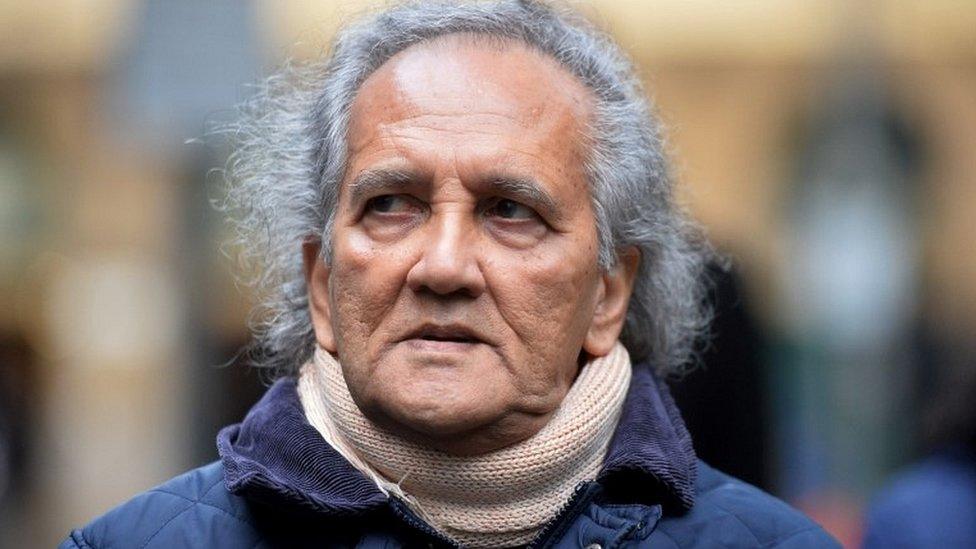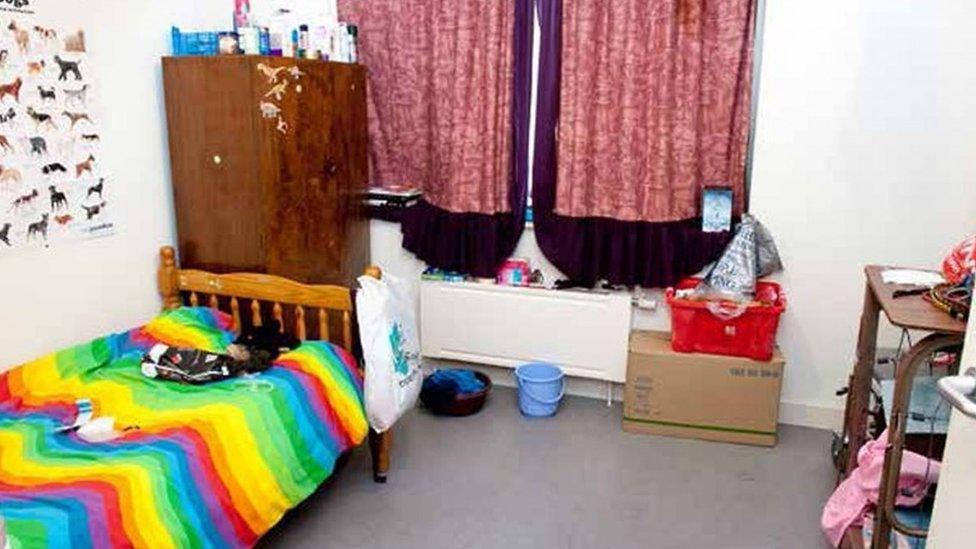Maoist cult: The woman who refused to be hidden
- Published
Balakrishnan's daughter told the BBC's Tom Symonds: "He wanted the whole world to be like the collective where he is in charge and everybody is his slave"
She is the woman who refused to be hidden. For three decades Fran was imprisoned in a cult, led by her father, that sought to mould her according to his radical views.
Her resistance and eventual escape in 2013 triggered a Metropolitan Police investigation that has now led to the conviction of cult leader Aravindan Balakrishnan.
No-one knew she existed.
She left the cult a 30-year-old who had been denied any kind of independent life, with limited experience of the outside world. She was, despite being highly intelligent, unable to perform basic tasks.
Her name is not Fran. In fact, the name she asked the BBC to use is not the one Balakrishnan gave her at birth, or the one she used during her years in the cult. Or the one she intends to use in future.
She wouldn't give us this name. But with it she is starting a new life. College, friends, a growing interest in somewhat more mainstream politics than the revolutionary communism she's grown up with.
She seemed bright, despite her limited education. Someone who knows her own mind, despite the years during which Balakrishnan spent brainwashing her.

Aravindan Balakrishnan used violence, fear and sexual degradation to control women he held captive
Fran was born in 1983. Her mother was Sian Davies, a cult member who had a long-term relationship with the married Balakrishnan, whom members called "Comrade Bala".
She has a stunning memory, perhaps due to the fact that she did so little which was memorable. Small events took on huge significance, and were recorded in her extensive diaries.
She can tell you the exact date she was allowed to watch a particular film, or visit a shop. Always accompanied. But her memories are filled with unhappy moments.
"My thoughts and feelings were mainly of fear," she told the BBC, "because I saw other people in the house being quite violently treated. Lots of shouting - and I myself was beaten up as well."
She was taught to venerate Balakrishnan, whom the cult treated as a deity. "My mother used to say he is god and he is the star of our lives so we have to worship him."
The cult told Fran her birth parents were deceased. Her father was said to have been a Peruvian revolutionary who died in combat and her mother an Englishwoman who died in childbirth. "This story was what I was meant to tell other people," she remembers.
"I didn't know exactly who I was. The feeling was like I was a waif or on the wayside being picked up by Bala and now he's my mum and dad."
During his trial, Balakrishnan justified this deceit by saying he wanted Fran to grow up without the concept of a traditional family. "The collective was literally the opposite of a nuclear family," he said.
The collective was founded in the 1970s and its initial creed was a form of puritanical communism based on the thoughts of China's Chairman Mao.
'Rule the world'
But the group's beliefs became ever more bizarre, taking in supernatural elements, eventually placing Balakrishnan at the centre of world history.
Fran says: "It was how he was going to rule the world and this was like a 'pilot unit' to test whether that will work."
Balakrishnan came to believe there was a "mind-control machine" called Jackie that had the power of life and death over cult members.
"He said that Jackie would help him to rule the world."

The room where Balakrishnan's daughter lived - she never played with other children
Jackie was "capable of doing whatever his master, which is Bala, wanted it to do, so all the earthquakes, tornadoes, hurricanes, all the natural disasters were because of him, as well as terrorist attacks".
"I used to think 'my God how am I ever going to escape'," Fran said. "'If the whole world is like this place, how am I ever going to escape?' And the only way to escape was to die, so I used to feel like killing myself.
"I remember when I was aged six I wanted to be run down by the Tube."
Cult members were encouraged to spy on each other and listen only to Bala.
Until 2013, Fran had only been out alone once in 30 years. Sometimes over a year would pass between tightly controlled trips outside.
"I remember being told that I'd be struck down by lightning or spontaneously combust if I went out on my own."
She never saw a doctor, went to school, or played with other children: "I wasn't allowed to mix with them," she says.
"I was even told not to look out of windows because it was bad to look out of windows, but sometimes I did and I used to see other children playing."
In one property she remembers: "The neighbour had a party for the little boy and there were balloons and slides in the garden. I was told not to look at that. But I did look and I used to feel that I'm missing out."
She was educated at home by her father and other cult members. "I was taught to write all about him. What I first learnt to write was I love beloved Comrade Bala. That's what my mum got me to write."
Her education also consisted of diaries criticising herself for failing to live up to Bala's ideals. Her mother oversaw the writing of the diaries and they played a role in Bala's trial, providing a record of beatings and indoctrination.
'Invisible barrier'
Her mother Sian died in 1997 after falling from a window at a house the cult then occupied. Fran also remembers another member, Oh Kareng, dying in mysterious circumstances in 2004. Three other members left and eventually only six people remained.
Fran eventually saw through her father's lies. "Once I saw the light I couldn't un-see the light," she says. She longed for freedom, but did not escape until 2013.
She was in need of medical attention and convinced another member, Josephine Herival, to contact a charity and the police. When finally taken to a doctor she was found to be suffering from severe diabetes.
The first people she met when she left the cult were Gerard Stocks and Yvonne Hall of the Palm Cove Society, who have supported her ever since. They describe her progress as "outstanding."
But adjusting to the world has been hard. Fran describes the feeling as being "like a goldfish bowl effect where I feel there's an invisible barrier between me and everybody else because nobody can understand what I feel like."
Fran is now studying at college and is leading an ever fuller life. She wants to "show love to other people in the way that love was not shown to me".
Of Balakrishnan, the man who imprisoned her, Fran says: "I forgive him."
"I would like to reconcile with him in the future, if he wants that. Because hatred does no good to anyone."
She abhors violence and conflict, having experienced so much of it herself, and refuses to be hateful.
"If I leave the place with anger and hatred and bitterness then I'm still in prison - and I don't want to be in prison that way."
- Published4 December 2015
